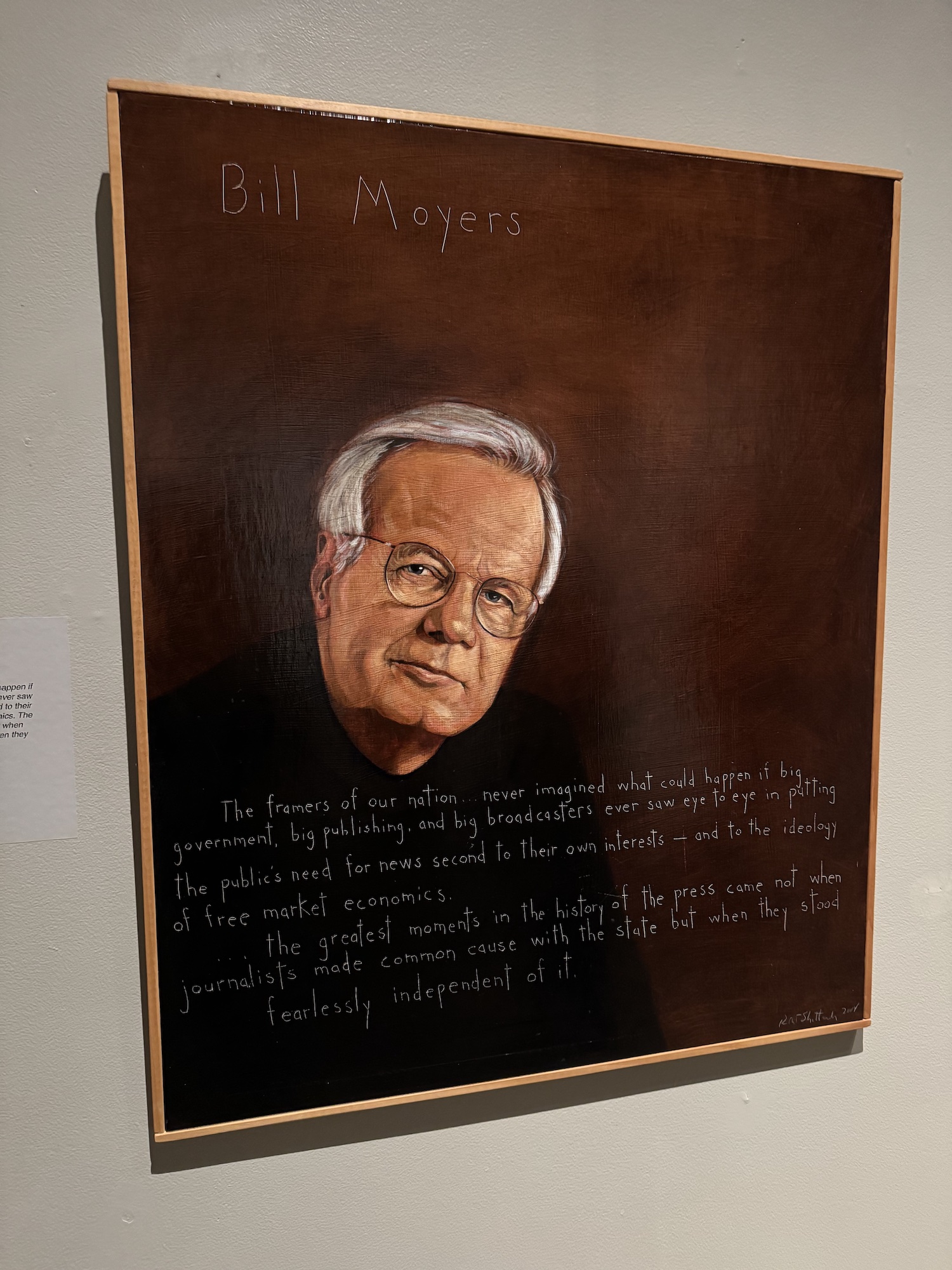Last weekend, we went into Albany, with my brother and sister-in-law, to have dinner with friends of theirs, and to attend an exhibit at the lovely Albany Institute of History and Art. The exhibit is called “Americans Who Tell The Truth,” and it features portraits by Robert Shetterly, along with quotes from his truth-telling subjects.
Shetterly’s art is unusual. His portraits are simple, even primitive in some respects. The bodies of his subjects, and the backgrounds of his paintings, are flat, lacking in detail, unremarkable. But the faces are nuanced, instantly recognizable, filled with life and spirit and personality. And the names of the subjects, as well as their quotations, are scratched into the paintings themselves (while the paint is still wet, as my brother, the painter, pointed out). Shetterly has painted more than two-hundred truth-tellers, including forty-two that have been selected for the Institute’s exhibit. Some of those included are obvious selections. Others are less well-known, and still others have somewhat checkered histories, which makes for an interesting blend of portraits.
On the one hand, featured subjects include Rosa Parks and Bayard Rustin, Pete Seeger and Ella Baker, Cecile Richards, the late president of Planned Parenthood, and Sister Helen Prejean, the anti-death-penalty crusader portrayed in the movie Dead Man Walking. But among the other truth-tellers whose portraits are on display, are John Brown, the anti-slavery activist whose violent raid on Harper’s Ferry in 1859 resulted in several deaths and helped to spark the Civil War; Mother Jones, the late-Nineteenth/early-Twentieth century labor organizer and activist; Frank Serpico, the New York city cop who resisted and later exposed corruption within the police department, at risk of his own life, and whose harrowing story was brought to life in Serpico, a 1973 movie starring Al Pacino and directed by Sidney Lumet.
 Yet, the figures who fascinated me most during our afternoon at the museum were those of whom I’d known nothing — not even their names — before seeing the exhibit. One of them was Leah Penniman, a food justice advocate and activist whose portrait exudes warmth and joy. Her quote is wonderful and worth repeating in full:
Yet, the figures who fascinated me most during our afternoon at the museum were those of whom I’d known nothing — not even their names — before seeing the exhibit. One of them was Leah Penniman, a food justice advocate and activist whose portrait exudes warmth and joy. Her quote is wonderful and worth repeating in full:
Our ancestral grandmothers braided seeds and promise into their hair before being forced into the bowels of transatlantic ships. As they plaited their okra, cowpea, millet and black rice into tight cornrows, they affirmed their hope in a future on soil. They whispered to us, their descendants:
“The road may be rough, but we will never give up on you.”
 Another was Grace Lee Boggs, an author and community organizer, who gazes out from her portrait appearing tough, frank, unwilling to put up with any BS. Her quote:
Another was Grace Lee Boggs, an author and community organizer, who gazes out from her portrait appearing tough, frank, unwilling to put up with any BS. Her quote:
People are aware that they cannot continue in the same old way but are immobilized because they cannot imagine an alternative… We need a vision that recognizes that we are at one of the great turning points in human history when the survival of our planet and the restoration of our humanity requires a great sea change in our ecological, economic, political, and spiritual values.
Few moments in our nation’s history have demanded more of American truth-tellers than the one we find ourselves in right now. We are governed by liars, bombarded by falsehoods every time we go online or turn on certain news channels, confronted by people — some of them friends, some of them family, most of them well-meaning — who have armed themselves with misinformation in order to parrot talking points they have heard on TV or from someone else who might be equally well-meaning and equally misinformed. Just the other day, I encountered online a post from someone I like and respect, who was repeating the jumble of untruths and recklessly manipulated data used by this Administration to justify their disastrous tariffs. I didn’t bother to comment. I didn’t wish to alienate a friend, nor did I have the energy or inclination to engage in a flame war. Instead, I allowed the disinformation to go unchallenged. I’m not proud of this.
Fallacy, disingenuousness, quackery, distortion. They pummel us. They insinuate themselves into every discourse. They are disheartening, infuriating, exhausting.
Which makes Robert Shetterly’s bold honoring of those who have stood up for truth again and again, all the more admirable, all the more important. We as a people have been challenged before by those who traffic in lies, and ultimately honesty has prevailed. Truth broke Joseph McCarthy’s fear-driven hold on the U.S. Congress, just as it ended the corrupt presidency of Richard Nixon. I choose to believe that it will wash away the bullshit that currently coats our most sacred institutions. But I have to be willing to stand up for honestly when next I am presented the opportunity. All of us do. We need to be inspired by those who inspired this exhibition.
 One of my favorite portraits was of a media hero of mine, PBS’s Bill Moyers. I will leave it to him to have the last word:
One of my favorite portraits was of a media hero of mine, PBS’s Bill Moyers. I will leave it to him to have the last word:
The framers of our nation never imagined what could happen if big government, big publishing, and big broadcasters ever saw eye to eye in putting the public’s need for news second to their own interests – and to the ideology of market economics.
The greatest moments in the history of the press came not when journalists made common cause with the state but when they stood fearlessly independent of it.










 This [see the photo above] will soon be our new home. It is in New York’s Hudson Valley, near Albany, on six-plus acres of beautiful land, complete with gardens, fruit trees, and a small pond. More important, it is maybe twenty minutes from my brother and sister-in-law, is equally close to one of my dearest friends and his partner, and is within easy drives of many other friends and family.
This [see the photo above] will soon be our new home. It is in New York’s Hudson Valley, near Albany, on six-plus acres of beautiful land, complete with gardens, fruit trees, and a small pond. More important, it is maybe twenty minutes from my brother and sister-in-law, is equally close to one of my dearest friends and his partner, and is within easy drives of many other friends and family.

 Our girls LOVED Sewanee Fourth of July when they were young. We would give them a bit of cash, help them meet up with friends, and then pretty much say goodbye to them for the day. It’s a small, safe, friendly town, and we never worried about them. They always found us eventually, sunburned and sweaty, their faces covered in face-paint, their pockets stuffed with candy that was thrown to kids by the parade participants. We’d go home, have a nap and some dinner, not that any of us was very hungry, and then, after covering ourselves with bug spray, would make our way to the fireworks venue.
Our girls LOVED Sewanee Fourth of July when they were young. We would give them a bit of cash, help them meet up with friends, and then pretty much say goodbye to them for the day. It’s a small, safe, friendly town, and we never worried about them. They always found us eventually, sunburned and sweaty, their faces covered in face-paint, their pockets stuffed with candy that was thrown to kids by the parade participants. We’d go home, have a nap and some dinner, not that any of us was very hungry, and then, after covering ourselves with bug spray, would make our way to the fireworks venue. My mind has been on Title IX again over the past month, as Nancy and I (and our daughters, while we were all together in Colorado) watched the Women’s World Cup. Soccer has long been a very big deal in our household. Our daughters grew up playing, first in weekend league soccer and then through middle school and high school. Both of them were accomplished players. Both of them continue to love the sport. And so we all look forward to the World Cup — men’s and women’s — the way we look forward to holidays and birthdays.
My mind has been on Title IX again over the past month, as Nancy and I (and our daughters, while we were all together in Colorado) watched the Women’s World Cup. Soccer has long been a very big deal in our household. Our daughters grew up playing, first in weekend league soccer and then through middle school and high school. Both of them were accomplished players. Both of them continue to love the sport. And so we all look forward to the World Cup — men’s and women’s — the way we look forward to holidays and birthdays. World Cup soccer — men’s and women’s — begins with what is called group play. The field of thirty-two is divided into eight groups of four. Each group plays among themselves, three matches for each team, and they get three points for a win, one point for a draw, and none for a loss. The two teams with the best record from each group advance to the knockout stage, so called because there are no ties, and the loser of each match is knocked out of the competition.
World Cup soccer — men’s and women’s — begins with what is called group play. The field of thirty-two is divided into eight groups of four. Each group plays among themselves, three matches for each team, and they get three points for a win, one point for a draw, and none for a loss. The two teams with the best record from each group advance to the knockout stage, so called because there are no ties, and the loser of each match is knocked out of the competition. Despite American disappointment, these developments actually constitute incredibly good news for women’s soccer around the world. Title IX paved the way for the U.S. women to become a dominant team, and in many European nations, where traditional football is THE sport, women’s teams have access to facilities and funding. But in other places this is simply not the case. The Jamaican woman faced so many financial hardships in their preparation for this year’s Cup that they literally had to rely on crowdfunding in order to participate.
Despite American disappointment, these developments actually constitute incredibly good news for women’s soccer around the world. Title IX paved the way for the U.S. women to become a dominant team, and in many European nations, where traditional football is THE sport, women’s teams have access to facilities and funding. But in other places this is simply not the case. The Jamaican woman faced so many financial hardships in their preparation for this year’s Cup that they literally had to rely on crowdfunding in order to participate.